Fukui International Meeting on Human Resources Development for Nuclear Energy in Asia
March 26th – 27th, 2013,
At JAPC Tsuruga Training Center (JAPC), Tsuruga-City, Fukui, Japan
Organized by Fukui Prefectural Government and The Wakasa Wan Energy Research Center (WERC)
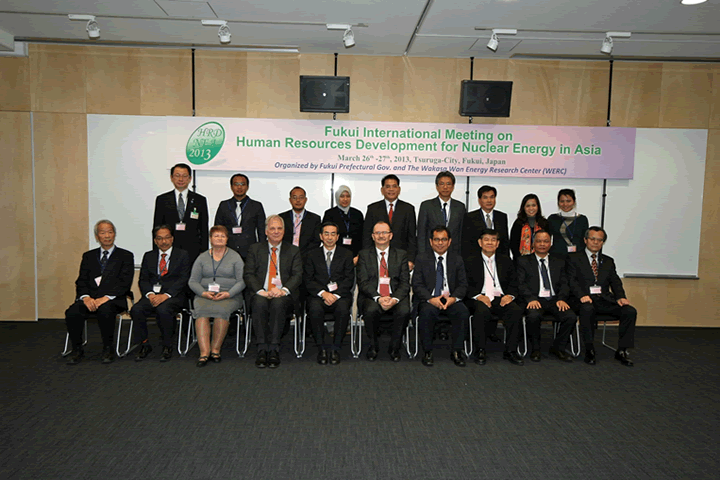
Summary
WERC and Fukui Prefectural Government organized international meeting named “Fukui International Meeting on Human Resources Development for Nuclear Energy in Asia” on 26th and 27th, March at Tsuruga Training Center of JAPC. Purpose of this meeting is to contribute for nuclear safety and human resources development in Asia through sharing of knowledge and discussion with participants from five Asian countries and IAEA.
The meeting is annual and the third from first meeting on 2010. Participants from Indonesia, Kazakhstan, Malaysia, Thailand, Vietnam, where newly planning to implement the nuclear power plant are consisted by governmental officials or staff of electric power company. In addition, two specialists from IAEA gathered and discussed with domestic participants such like governmental official, professor of university, staff of electric power company, and so on.
Detail of each session is described as bellow.
Session 1 : Opening Session
On the beginning of the opening session, Mr. Issei Nishikawa, governor of Fukui Prefecture, make address on the meeting. He expressed his gratitude for all of participants who traveled long way from their home country and mentioned his passion to make Fukui as thriving hub of HRD activities.
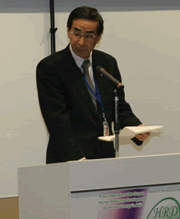
Mr. Issei Nishikawa
(Governor of Fukui prefecture)
Session 2 : Keynote Lecture
5 lecturers, from IAEA, Nuclear Regulation Authority of Japan and WERC presented keynote lecture regarding Japan’s nuclear energy policy, IAEA action plan, nuclear regulation system of Japan, and so on. Dr. Somporn Chongkum handled first half of the session as a chair, and Dr. Muhd Noor Muhd Yunus did on last half of the session. Refer to materials of each keynote lecture as below.
”Current Status of Japan’s Nuclear Energy Policy” by Mr. Junichi Iwasaki, METI
“Nuclear Power Strategy after the Fukushima Daiichi NPP Accident” by Mr. Pal Vincze, IAEA
“Prospect of Nuclear Applications for Sustainable Development and Welfare” by Dr. Sueo Machi, WERC
“Strengthening nuclear safety and IAEA Action Plan after Accident of Fukushima” by Dr. Piet Muskens, IAEA
“Nuclear Regulation Systems and Standard of Japan” by Mr. Shin Morita, NRA
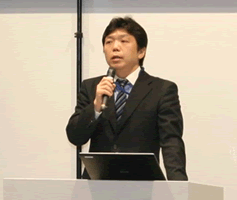 Mr. Junichi Iwasaki (METI) |
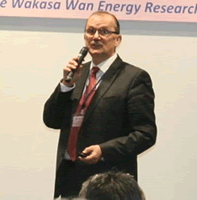 Mr. Pal Vincze (IAEA) |
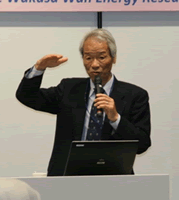 Dr. Sueo Machi (WERC) |
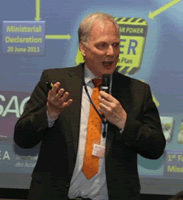 Dr. Piet Muskens (IAEA) |
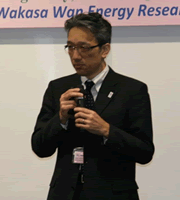 Mr. Shin Morita (NRA) |
Session 3 : Nuclear Power Program and Challenges in Asian Countries
Country report of participating countries were presented by Indonesia, Kazakhstan, Malaysia, Thailand and Vietnam. The subject of presentation was current status of nuclear power implementation according to their nuclear power policy and challenges in each newcomer countries.
Refer to materials of each presentation as below.
“Indonesia” by Mr. Sonden Winarto, MEMR
“Kazakhstan” by Dr. Volkova Tatyana, NNC
“Malaysia” by Ms. Saliza Binti Jam, MNPC
“Thailand” by Mr. Samerjai Suksumek, Ministry of Energy
“Vietnam” by Ms. Dang Thi Hong, VAEA
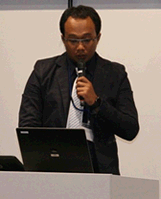 Mr. Sonden Winarto (MEMR, Indonesia) |
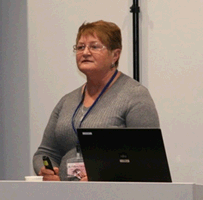 Dr. Volkova Tatyana (NNC, Kazakhstan) |
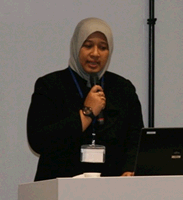 Ms. Saliza Binti Jam (MNPC, Malaysia) |
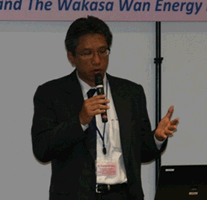 Mr. Samerjai Suksumek (Ministry of Energy, Thailand) |
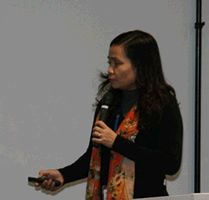 Ms. Dang Thi Hong (VAEA, Vietnam) |
After the presentation, all of participants discussed regarding the implementation of nuclear power based on the chairman; Dr. Ferhat Aziz’s handling. The discussion has fevered and many beneficial comments were mentioned. Especially, many participants were interested in the field of PA, public acceptance, which is common topic when some country will proceed nuclear power generation. From the view of IAEA, importance of faith, transparency and respect for society including support from government was stressed. Furthermore, discussion was excited with one more vital subject, safety management. Many participants mentioned the importance of the safety management. And most impressive idea was talked that “Safety management is not to manage the safety of nuclear power but to manage the human resources who can manage the safety”. This conclusion is crucial for us who is conducting many HRD activities.
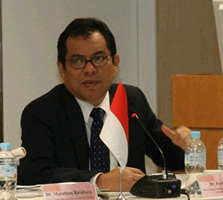
“Chairman on the session 3"
Dr. Ferhat Aziz (BATAN, Indonesia)
Session 4 : Growing Nuclear Applications for Sustainable Development of Asian Countries
Same as in the session 3, country report of participating countries was presented by five participating countries, and also Japan make a presentation. The subject of presentation was focused on the radiation application technology which is utilizing at each country. As all of participating counties are proceeding competent technology in this field, every presenter make their presentation very enthusiastically, and shared beneficial information each other.
Refer to materials of each presentation as below.
“Indonesia” by Dr. Ferhat Aziz, BATAN
“Kazakhstan” by Dr. Volkova Tatyana, NNC
“Malaysia” by Dr. Muhd Noor Muhd Yunus, Malaysian Nuclear Agency
“Thailand” by Dr. Somporn Chongkum, TINT
“Vietnam” by Dr. Cao Dinh Thanh, VINATOM
“Japan” by Dr. Sueo Machi, WERC
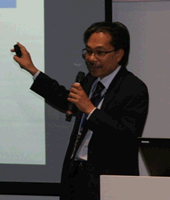 Dr. Muhd Noor Muhd Yunus (Malaysian Nuclear Agency) |
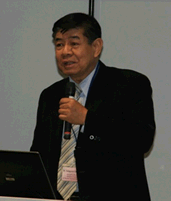 Dr. Somporn Chongkum (TINT, Thailand) |
After the presentation, participants discussed about the development of radiation application technology in Asia. Dr. Cao Dinh Thanh handled the discussion as a chair. So this field is already thriving in each country and all of presenter is professional of this field that many informative opinions stated. In the Asia, radiation technology is implementing mainly on the agricultural field. So that Japanese most-advanced utilization of radiation technology in the medical field is the center of attention. Especially, Fukui has advanced proton cancer therapy facility, so that many participants are interested in this topic such as cost of facility and benefit of the therapy. On the other hand, many industrial companies are not yet aware a usability of radiation technology and there are big obstacle for a private company to initialize the new radiation technology to their business. Conclusion stated that in order to resolve this problem, interactive communication between industrial arena and R&D institutes is crucial.
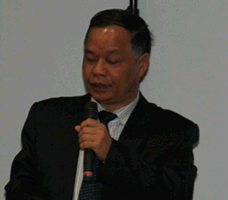
“Chairman on the session 4”
Dr. Cao Dinh Thanh (VINATOM)
Session 5 : Strategy of HRD for promotion of nuclear power and application program in Asian countries
Session 5 was focused on human resources development (HRD) for promotion of nuclear power and application program in Asia, and discussed regarding a circumstances and needs. In advance of the discussion, four of lead speech was presented from IAEA, WERC, Fukui prefectural government. Mr. Pal Vincze from IAEA explained IAEA’s HRD program of introducing nuclear power generation, including IAEA’s policy, strategy, activities, and challenges after Fukushima accident. Dr. Sueo Machi from WERC gave a presentation about Japan’s HRD program, which reported past record of Japanese activities of nuclear power and application field for many Asian countries and activities of FNCA, Forum of Nuclear Cooperation in Asia. From Fukui prefectural government, Mr. Masato Hasegawa showed many regional developments as a municipality at where nuclear power plant is located. Dr. Kawanishi from WERC explained concrete activities of Fukui prefecture and WERC for HRD of nuclear generation in Asian countries, such like training course, seminar in foreign countries, researcher acceptance program, and so on.
Refer to materials of each lead speech as below.
“IAEA Human Resource Development Programs” by Mr. Pal Vincze, IAEA
“Nuclear HRD Program of Japan” by Dr. Sueo Machi, WERC
“Nuclear Power Generation and Regional Development” by Mr. Masato Hasegawa, Fukui Prefectural Government
“Nuclear HRD Program of Fukui Prefecture” by Dr. Shunichi Kawanishi, WERC
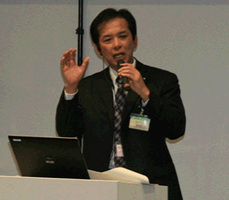 Mr. Masato Hasegawa (Fukui Prefectural Government) |
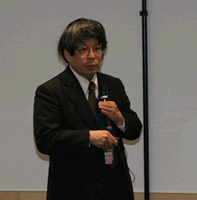 Dr. Shunichi Kawanishi (WERC) |
After the presentation, participants discussed about the circumstances
and needs of each countries, especially focus on challenges of HRD in the
field of nuclear power program/nuclear application, improvements of training
program of WERC, and so on. Dr. Sueo Machi handled the discussion as a
chair. Many participants admired Fukui’s circumstance as ideal model of
municipality where has nuclear power plant, because Fukui has succeeded
to establish interactive cooperation between nuclear business company and
local community, furthermore Fukui dose not only generate electricity but
also support many R&D activities in the field of application technology
such like radiation breeding or advanced proton therapy for cancer. IAEA
expressed their intention to support Fukui’s activities which would be
very beneficial for both of new comer and already introduced countries
of nuclear generation. In addition, many countries stressed importance
of PA activities and appreciate WERC’s PA training course for Vietnam,
and they demanded expansion of the training course for another countries.
On the other hands, WERC’s plant safety training course for technical staff
is also attracted attention, and notion to optimize the course for cultivating
specialists or teachers of nuclear power field in each country was mentioned
by some participants.
There was many informative and helpful opinions in the discussion, and WERC would consider all those opinion and enhance the activities.
Session 6 : Closing Session
Finally on the session 6, Dr. Sueo Machi concluded the meeting with summing up all of comment mentioned during presentation and discussion. Summary of the conclusion is written as below.
- Common topics of introducing nuclear power plant, HRD management, PA activity for all of participating countries has mentioned.
- We should make exertions doing consistent public acceptance activity with complete transparency in order to develop public acceptance of nation people.
- In Japan, there is huge experience of nuclear generation and application technology in medical, agricultural, industrial use, and we would like to share these experiences with Asian countries.
- As already Japan doing, cooperation of HRD activities should be based on the experience and knowledge. And activities of WERC will be enhanced and developed furthermore considering comments which provided in this meeting.
- Support from IAEA is very important in all of activities, so that WERC would like to strengthen the relationship with IAEA.
